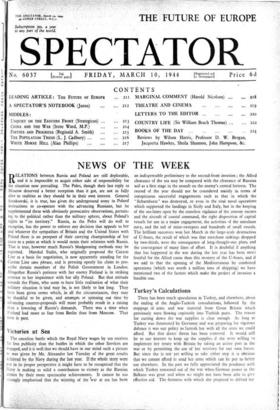Victories at Sea
The ceaseless battle which the Royal Navy wages by sea receives far less publicity than the battles in which the other Services are engaged, and it is well that we should have in our mind such a picture as was given by M. Alexander last Tuesday of the great results achieved by the Navy during the last year. If the whole story were Put in its proper perspective it might have to be recognised that the Navy is making as solid a contribution to victory as the Russian armies by their more spectacular achievements. It cannot be too strongly emphasised that the winning of the .war at sea has been an indispensable preliminary to the second-front invasion ; the Allied clearance of the sea may be compared with the clearance of Russian soil as a first stage in the assault on the enemy's central fortress. The record of the year should not be considered mainly in terms of conspicuous successful engagements such as that in which the Scharnhorst ' was destroyed, or even in the vital naval operations which supported the landings in Sicily and Italy, but in the keeping of the sea-lanes open by the ceaseless vigilance of the convoy escorts and the aircraft of coastal command, the right disposition of capital vessels for use in a major engagement, the activities -)f the merchant navy, and the toil of mine-sweepers and hundreds of small vessels. The brilliant successes won last March in the large-scale destruction of U-boats, the result of which was that merchant sinkings dropped by two-thirds, were the consequence of long-thought-out plans and
the convergence of many lines of effort. It is doubtful if anything that has happened in the war during the last year has been more fruitful for the Allied cause than this mastery of the U-boats, and if
we add to that the opening of the Mediterranean by combined operations (which was worth a million tons of shipping) we have mentioned two of the factors which make the project of invasion a feasible one.


























